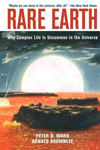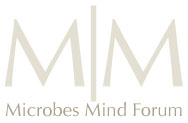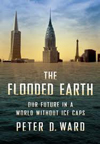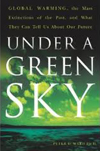Peter D Ward: Rare Earth a Decade+ Later

 |
Talk by Peter D. Ward | Books by Peter D Ward |
Rare Earth a Decade+ Later: what we know now
The Rare Earth Hypothesis argues that the emergence of complex multicellular life on Earth required an improbable combination of circumstances described in the book Rare Earth: Why Complex Life Is Uncommon in the Universe(2000) by Peter Ward and Donald E. Brownlee. By concluding that complex life is uncommon in the universe, the Rare Earth Hypothesis makes addressing climate change an imperative. Peter Ward now focuses his work on the challenge of climate change, with books such as Under a Green Sky: Global Warming, the Mass Extinctions of the Past, and What They Can Tell Us About Our Future.Planetary habitability relies on many factors, including chance. One of the potential causes of a loss of habitability comes from planetary bio-catastrophes, which can be caused by asteroid or comet impact, high levels of transient radiation – and from a planet’s own microbes. In this talk Peter Ward will explore examples from the fossil record where data from microbial cell wall biomarkers shows that microbes produced high levels of oceanic and atmospheric hydrogen sulfide gas, enough, repeatedly during the Mesozoic, to endanger animals, plants, plankton, as well as oxygenic microbes. These mass extinctions are marked by fossil record depletions, isotopic changes in carbon and sulfur, and shifts in elemental cycling and microbial communities. Their aftermath required recovery periods characteristically on the order of one to five million years. Paradoxically, while the mass extinctions of Earth history demonstrate applicability to understanding habitability and its continuance on Earth-like planets elsewhere in the Cosmos, new research, to be recounted in this talk, demonstrates that the mass extinctions had beneficial effects that continue to this day. The most intriguing is the recent discovery in Ward’s lab (leading to a successful patent) is that low dose hydrogen sulfide vastly increases plant growth, which could be a key to addressing human food and energy needs. On the negative side, he will also show that Uranium concentrated into Yellowcake is a product of the concentration resulting from past mass extinctions on Earth.
Peter Douglas Ward, a paleontologist and professor of Biology and of Earth and Space Sciences at the University of Washington, Seattle, also a scientist with the NASA Astrobiology Institute, has written a series of “big ideas” books presenting provocative hypotheses to be explored in the Microbes Mind Forum. Ward’s field research specializes in the Cretaceous–Tertiary extinction event, mass extinctions generally, and what the fossil record indicates about biodiversity and a potential future mass extinction event, which he characterizes as The Medea Hypothesis, which was named one of the 100 most important ideas of 2009 by the New York Times. He contends that multicellular life, understood as a superorganism, is suicidal. According to Ward’s 2007 book, Under a Green Sky, all but one of the major extinction events in history have been brought on by climate change — the same global warming that occurs today. The author argues that events in the past can give valuable information about the future of our planet. Reviewer Doug Brown goes further, stating “this is how the world ends.” Scientists at the Universities of York and Leeds also warn that the fossil record supports evidence of impending mass extinction. Ward’s best-selling book on the origin of life, Rare Earth: Why Complex Life Is Uncommon in the Universe (co-authored with Donald Brownlee, 2000) characterizes the unique attributes that make Earth a habitable planet and remains the most widely read astrobiology book ever written. It was featured in an episode of ABC Nightline and named by Discover Magazine one of the ten most important science books of 2001. While astronomers searching for habitable extra-solar planets (super-Earths) contest the Rare Earth Hypothesis, Ward and Brownlee put forth a compelling argument for treating Earth as rare and exceptional until proven otherwise. Ward’s latest book, The Flooded Earth: Our Future In a World Without Ice Caps (2010) examines the future implications of global climate change. In 2008 he was the main speaker at TED; in 2010 he was named Faculty Lecturer at the University of Washington, the University’s highest annual academic honor.


